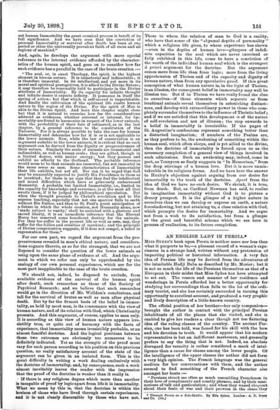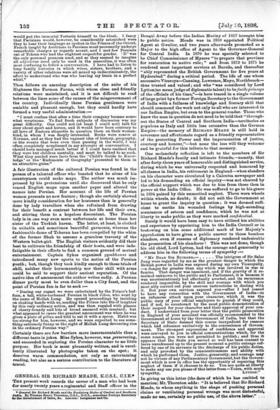AN ENGLISH LADY IN PERSIA.*
Miss SY1tES'S book upon Persia is neither more nor less than what it purports to be,—a pleasant record of a woman's expe- riences in a strange land, written without any pretension imparting political or historical information. A very fair
idea of Persian life may be derived from the adventures of the inimitable Hadji Baba. as described by Mr. Morier; but it is not so much the life of the Persians themselves as that of a European in their midst that Miss Sykes has here attempted to set out. The reason and manner of her residence and wanderings in Persia afforded her a better opportunity for studying her surroundings than falls to the lot of the ordi- nary tourist, and she has certainly succeeded in turning this opportunity to excellent account, and produced a very graphic and lively description of a little-known country.
The official position of her brother—her only companion— brought the author in contact with the principal Persian inhabitants of all the places that she visited, and she is enabled to give her readers a clear though not too flattering idea of the ruling classes of the country. The ancient Per- sian, one has been told, was famed for his skill with the bow and his devotion to truth. It would appear that his modern representative is but an indifferent marksman, and generally prefers to say the thing that is not. Indeed, an absolute disregard for veracity is rather considered a mark of intel- ligence than a cause for shame among the lower people. 0) the intelligence of the upper classes the author did not form a very high opinion. The French language was the general medium for her conversations with them, and the author seemed to find something of the French character also amongst her hosts :-
" Persians struck me often as much resembling Frenchmen in their love of compliments and courtly phrases, and by their man- nerisms of talk and gesticulation; and when they waxed eloquent about their feats of war and their prowess in the chase they • Through Persia on a Side-Saddle. By Ella Sykes. London : A. D. Uses and Co. [las.]
would put the immortal Tartarin himself to the blush. I fancy that Parisians would, however, be considerably astonished were they to hear their language as spoken in the France of the Orient. French taught by Austrians to Persians must necessarily undergo remarkable changes as regards accent, and I met few Persians
out of Tehran who had the slightest respect for gender. ' was the only personal pronoun used, and as they seemed to imagine all adjectives need only be used in the masculine, it was often most confusing to follow a conversation. I have had to listen to long family histories in which wives, sisters, brothers, and a variety of other relations were all mixed up indiscriminately, the effort to understand who was who leaving my brain in a perfect whirl."
Then follows an amusing description of the suite of his Highness the Farman Farma, with whom close and friendly
relations were maintained, and it is not difficult to read between the lines some of the causes of the misgovernment of the country. Individually these Persian gentlemen were
amiable and pleasant enough, but they could hardly have formed a very useful administration :—
" I must confess that after a time their company became some- what wearisome. To find fresh subjects of discussion was my great difficulty. One could not (at least I could not) talk for ever about sport and horses, and it would have been contrary to all laws of Eastern etiquette to question them on their woman- kind, in whom I was deeply interested. Books were scarce at Kerman, and as they had the vaguest idea of history, geography, or the events that were even then passing in the world, I was often completely nonplussed in my attempts at conversation. I should have managed much better if I could have realised that they were but children mentally, and must be talked to as such. What they needed were facts from the Child's Guide to Know- ledge' or the Rudiments of Geography ' presented to them in an attractive guise."
A fair illustration of the cultured Persian was found in the person of a talented officer who boasted that he alone of his countrymen could make maps. The author was much im- pressed by his pretensions until she discovered that he only
traced English maps upon another paper and altered the names into Persian. Her account of the life of Persian women presents no new feature ; though she certainly showed more kindly consideration for her hostesses than is generally done by lady travellers when she refrained from drawing for their benefit a contrast between her life and their own, and stirring them to a hopeless discontent. The Persian lady is in one way even more unfortunate at home than her sister of the Turkish harem. The latter, at least, is clothed in suitable and sometimes beautiful garments, whereas the fashionable dame of Teheran has been compelled by the whim of the former Shah to assume a graceless travesty of the
Western ballet-girl. The English visitors evidently did their best to cultivate the friendship of their hosts, and were inde- fatigable in their efforts to find a common ground of mutual
entertainment. Captain Sykes organised gymkhanas and introduced many new sports to the notice of the Persian youth; but, though they took kindly enough to these trials of skill, neither their horsemanship nor their skill with arms
could be said to support their ancient reputation. Of the native idea of amusement the author writes sadly. A Persian dinner party must be even duller than a City feast, and the point of Persian fun is far to seek :-
" During our repast we were entertained by the Prince's buf- foon, a tall, white-turbaned Persian in black robes, who went by the name of Mollah Lung. He opened proceedings by insisting on shaking hands with us, sending the Prince into fits of laughter by this very ordinary action, and was then regaled with glasses of cherry-brandy and bits of bread smeared with mustard ; but what appeared to cause the greatest amusement was when he was given a plate of pillau and told to eat it with a spoon. Habit was too strong for him, however, and we were expected to see some- thing extremely funny in the sight of Mollah Lung devouring rice in the ordinary Persian way."
Certainly there are few barriers more insurmountable than a different taste in jokes. Miss Sykes, however, was persevering, and succeeded in exploring the Persian character to no little purpose. Her book is most pleasantly written, and is excel- tautly illustrated by photographs taken on the spot ; it deserves warm commendation, not only as entertaining
reading, but also as a serious contribution to the literature of itravel.



































 Previous page
Previous page